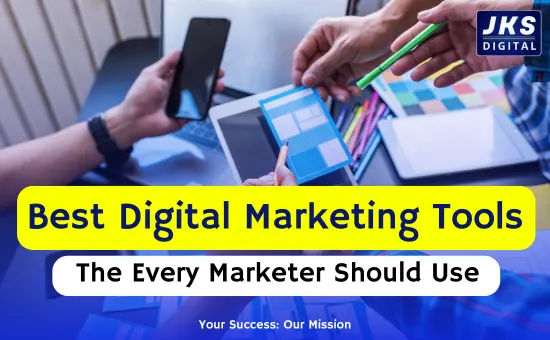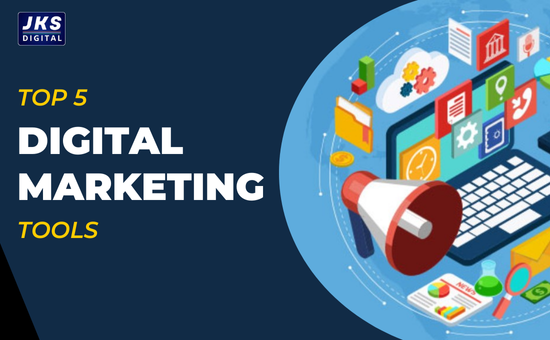Digital Marketing Tools: Having the correct tools is critical in the fast-paced world of digital marketing. These tools streamline operations, provide deep insights, and enhance the overall effectiveness of campaigns. Below is a detailed explanation of some of the most powerful digital marketing tools available, their features, and how they can benefit marketers.

1. Google Analytics 4 (GA4)
Category: Analytics and Insights
Features:
- Cross-Platform Tracking: GA4 allows seamless tracking of user behavior across websites and mobile apps, offering a unified view of customer interactions.
- Event-Based Data Model: Replaces traditional session-based tracking with event-based tracking, enabling more granular analysis.
- Predictive Analytics: Leverages AI to predict user behavior, such as churn probability or potential purchase likelihood.
- Enhanced Data Privacy: Adheres to privacy standards with better data collection protocols and cookieless tracking options.
Benefits:
- Deeper Insights: Helps marketers understand customer journeys in greater detail.
- Improved Decision-Making: Provides actionable recommendations using predictive metrics.
- Privacy Compliance: Ensures data collection is compliant with modern privacy laws.
2. SEMrush
Category: SEO and Competitive Analysis
Features:
- Keyword Research: Identifies high-value keywords with search volume, difficulty scores, and competition analysis.
- SEO Audit: Analyzes website health and provides actionable recommendations to improve search rankings.
- Competitor Analysis: provides detailed information into competitors’ strategy, such as backlinks, keywords, and content performance.
- Content Marketing Toolkit: Suggests topic ideas, optimizes content, and tracks performance.
Benefits:
- Boost Organic Traffic: Helps rank higher on search engines by optimizing content and targeting the right keywords.
- Stay Ahead of Competitors: Provides a clear picture of what competitors are doing and how to outperform them.
- Time-Saving: Automates complex SEO tasks, reducing the workload for marketers.
Read also – SEO vs. PPC: Which Strategy Works Best for Your Brand?
3. HubSpot Marketing Hub
Category: CRM and Marketing Automation
Features:
- Lead Management: Tracks and manages leads throughout the buyer’s journey.
- Email Marketing Automation: Enables personalized email campaigns with advanced segmentation.
- Social Media Scheduling: Allows users to plan, schedule, and track social media posts across platforms.
- Analytics Dashboard: Consolidates data from campaigns to measure ROI effectively.
Benefits:
- Enhanced Customer Relationships: Helps build and maintain meaningful connections with customers.
- Improved Efficiency: Automates repetitive tasks, freeing up time for strategic planning.
- Scalability: Suitable for all business sizes, from startups to enterprises.
4. Canva
Category: Visual Content Creation
Features:
- Intuitive Design Interface: Drag-and-drop tools make it easy to create professional visuals.
- Templates Library: Offers thousands of customizable templates for social media, presentations, and marketing materials.
- Collaboration Tools: Teams can work on projects in real time.
- Video Editing: Includes tools for creating animations and editing video content.
Benefits:
- Professional-Looking Designs: Non-designers can produce high-quality visuals with ease.
- Cost-Effective: Eliminates the need for expensive design software.
- Time-Saving: Quickly produces visuals, reducing time spent on content creation.
Read also – Black Hat SEO in 2025: Risks, Penalties, and Alternatives
5. Buffer
Category: Social Media Management
Features:
- Multi-Platform Scheduling: Schedule and publish posts on platforms like Facebook, Twitter, Instagram, and LinkedIn.
- Content Calendar: Provides a visual calendar for planning and tracking campaigns.
- Analytics and Reporting: Offers detailed metrics on engagement, reach, and audience growth.
- Team Collaboration: Allows teams to work together on social media strategies.
Benefits:
- Consistent Posting: Ensures regular updates to keep the audience engaged.
- Data-Driven Strategies: Insights from analytics help refine social media strategies.
- Effortless Management: Reduces the complexity of managing multiple platforms simultaneously.
6. ChatGPT for Content Creation
Category: AI-Powered Content Generation
Features:
- Content Drafting: Creates blog posts, social media captions, and ad copy based on user prompts.
- Creative Suggestions: Offers topic ideas and outlines for various types of content.
- Customizable Tone: Adapts writing style and tone to fit brand guidelines.
- Instant Responses: Provides quick answers to queries, aiding in research and planning.
Benefits:
- Streamlined Content Creation: Saves time by generating drafts and ideas instantly.
- Enhanced Creativity: Assists in brainstorming fresh and engaging content ideas.
- Cost Efficiency: Reduces dependency on additional resources for content creation.
Read also – When to Do Content Marketing? Know the Right Strategy and Timing
7. Ahrefs
Category: SEO and Backlink Analysis
Features:
- Backlink Checker: Provides detailed information about backlink profiles, including quality and referring domains.
- Keyword Explorer: Discovers relevant keywords with data on search volume, difficulty, and potential traffic.
- Content Gap Analysis: Identifies topics your competitors are ranking for but you are not.
- Site Audit: Evaluates website performance and highlights SEO issues.
Benefits:
- Better Backlink Strategies: Helps build quality backlinks to improve domain authority.
- Higher Search Rankings: Optimizes on-page and off-page SEO elements effectively.
- Comprehensive Competitive Analysis: Helps uncover opportunities to outperform competitors.
Read also – Social Media Growth Strategies: Top Tips for 2025
8. Mailchimp
Category: Email Marketing
Features:
- Drag-and-Drop Email Builder: Makes designing emails simple and intuitive.
- Automation: Sends targeted emails based on user behavior, such as abandoned cart reminders or welcome series.
- Advanced Segmentation: Segments audiences based on criteria like location, purchase history, and engagement.
- A/B Testing: Tests different subject lines, designs, or CTAs to find the most effective approach.
Benefits:
- Personalized Communication: Enhances customer engagement through tailored messaging.
- Improved Conversions: Drives more sales and interactions with strategic automation.
- Measurable Results: Provides detailed metrics to track open rates, click-throughs, and conversions.
9. Sprout Social
Category: Social Media Analytics and Engagement
Features:
- Unified Inbox: Consolidates all social media messages into one interface for easy management.
- Social listening: Tracks talks about your brand, industry, or competitors.
- Post Scheduling: Plans and publishes posts at optimal times for maximum reach.
- Detailed Analytics: Tracks performance metrics such as engagement, impressions, and follower growth.
Benefits:
- Stronger Engagement: Helps interact with your audience in real-time, building loyalty.
- Improved Brand Awareness: Identifies trends and opportunities through social listening.
- Data-Driven Improvements: Refines strategies based on detailed performance insights.
10. Trello
Category: Project Management
Features:
- Kanban Boards: Visualize tasks in columns such as “To Do,” “In Progress,” and “Completed.”
- Custom Workflows: Tailor boards to fit specific project needs.
- Integrations: Connects with tools like Slack, Google Drive, and Dropbox.
- Collaboration Features: Enables team communication and file sharing within tasks.
Benefits:
- Organized Campaigns: Keeps marketing projects on track and ensures deadlines are met.
- Team Productivity: Facilitates collaboration and task delegation.
- Better Focus: Provides a clear overview of priorities, reducing confusion.
Read also – 10 Proven Backlink Strategies to Elevate Your SEO Game
Conclusion
The success of digital marketing campaigns depends on the tools marketers use. By integrating these powerful tools into your strategies, you can improve productivity, enhance performance, and achieve your marketing goals efficiently. Whether it’s optimizing SEO, creating stunning visuals, or managing social media, these tools are designed to help you succeed in an increasingly competitive landscape.






